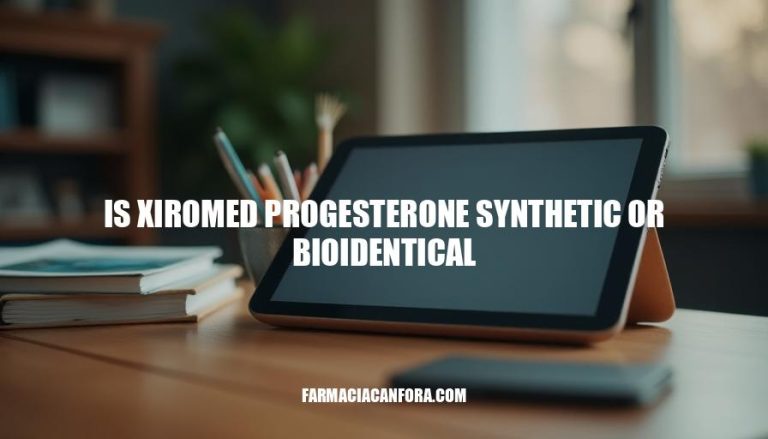


When it comes to hormone replacement therapy (HRT), knowing if Xiromed progesterone is synthetic or bioidentical is really important. Synthetic hormones are made in a lab and try to mimic the body’s natural hormones, but they’re not exactly the same. Bioidentical hormones, on the other hand, are identical to what your body produces naturally and come from plant sources.
This difference matters because it affects how well your body responds to treatment. Synthetic hormones can sometimes cause side effects due to their slight differences from natural hormones. Bioidentical hormones tend to be better tolerated and might offer a more natural way to manage hormone levels.
Understanding this can help you choose the best treatment for your specific health needs.
Xiromed Progesterone is a bioidentical hormone, meaning it is chemically identical to the progesterone produced naturally by the human body. This bioidentical progesterone is derived from natural sources such as wild yams and soybeans. The production process involves extracting the phyto-hormones from these plants and then converting them into progesterone through a series of chemical reactions.
In contrast, synthetic progestins, such as medroxyprogesterone acetate (Provera), are man-made and have a different chemical structure from natural progesterone.
While they mimic the effects of progesterone, their altered structure can lead to different interactions with progesterone receptors in the body, potentially causing unwanted side effects like mood swings, weight gain, and increased cardiovascular risks.
Bioidentical progesterone, like Xiromed Progesterone, is preferred in hormone replacement therapy (HRT) because it closely mimics the body’s natural hormonal activity. Studies have shown that bioidentical hormones are generally better tolerated and have fewer side effects compared to synthetic progestins. For example, bioidentical progesterone is often used to treat menopausal symptoms, support pregnancy in cases of progesterone deficiency, and manage conditions like premenstrual syndrome (PMS) and perimenopausal symptoms.
Experts in the field of hormone research emphasize the importance of distinguishing between bioidentical progesterone and synthetic progestins.
Dr. Laura Neville, a hormone specialist, highlights that natural progesterone is protective of the breast and other tissues, while synthetic progestins can increase the risk of breast cancer and other health issues. The Women’s Health Initiative study found that synthetic progestins, when added to estrogen in HRT, increased the risk of breast cancer much more than estrogen alone.
In summary, Xiromed Progesterone is a bioidentical hormone derived from natural sources and is structurally identical to the progesterone produced by the body. It is preferred over synthetic progestins due to its better tolerability and fewer side effects.
Experts recommend using bioidentical hormones for hormone replacement therapy to achieve better health outcomes.
Xiromed Progesterone is a bioidentical hormone, meaning it is chemically identical to the progesterone produced naturally by the human body. It is derived from natural sources such as wild yams and soybeans through a series of chemical reactions.
This distinction is important because bioidentical hormones tend to be better tolerated and have fewer side effects compared to synthetic progestins.
Synthetic progestins, on the other hand, are man-made and can cause unwanted side effects like mood swings, weight gain, and increased cardiovascular risks due to their altered chemical structure.
Bioidentical progesterone, such as Xiromed Progesterone, is preferred in hormone replacement therapy (HRT) because it closely mimics the body’s natural hormonal activity.
Experts emphasize that bioidentical hormones are generally better tolerated and have fewer side effects compared to synthetic progestins. In fact, studies have shown that bioidentical progesterone can be used to treat menopausal symptoms, support pregnancy in cases of progesterone deficiency, and manage conditions like premenstrual syndrome (PMS) and perimenopausal symptoms.
Knowing whether Xiromed Progesterone is synthetic or bioidentical is crucial for those considering or currently using it. This information can help individuals choose the best treatment for their specific health needs and avoid potential side effects associated with synthetic hormones.